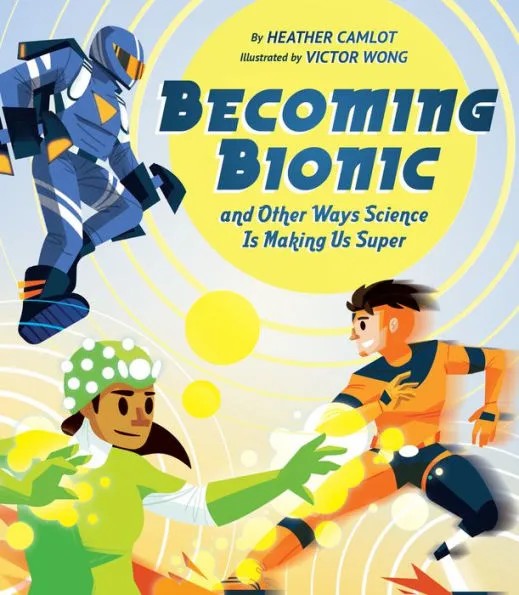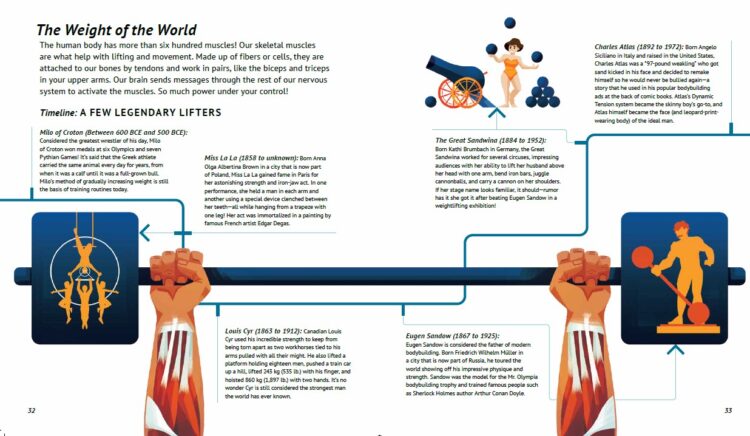 Welcome to Cantastic Authorpalooza, featuring posts by and about great Canadian children’s book creators! Today’s guest: Heather Camlot. Take it away, Heather!
Welcome to Cantastic Authorpalooza, featuring posts by and about great Canadian children’s book creators! Today’s guest: Heather Camlot. Take it away, Heather!
How does an author known for books about history, social justice and sports write a book about science and superheroes? By calling up her past.
I never studied science, and I’m certainly not a superhero (I don’t think), but as a journalist I spent a decade writing health articles for leading Canadian magazines and websites, and even longer writing about the arts – film, television, fine arts and music — for publications on both sides of the border. Those two disparate topics – health and arts – were how I made my living for a very long time.
“I can do this all day” – Captain America
Fast-forward to my work translating articles for Owl Magazine from its French sister publication Les Débrouillards. But I didn’t just translate the words on the pages, I soaked up these amazing stories of flying men, invisible towers, and strong fibers made from slime. I saved them all, not only because I contributed to them, but because I felt like there was so much more to tell.
I continued to collect other fascinating stories that I came across in my daily newspaper and began researching online. Journalists are trained to do research, and I can easily lose myself in that online rabbit hole, digging and digging until I find a gem that I need to share. Some days I wish I could stay down there forever! Eventually, I had a treasure chest of gems, and somehow it struck me (with my super-brain?) that they were oddly similar to the superpowers that film, television and comics have been entertaining us with for almost a century. Science IS turning us into superheroes!
“Flame on!” – The Human Torch
Using six main superpowers – parts, flight, sight, strength, brains and survival — to break up the content of what would become Becoming Bionic made it easier to do further research and draw up a nonfiction proposal about science and superheroes – about health and arts. And I sent that proposal along to the one publisher I knew would likely be interested: Sibling to Owl Magazine, Owlkids Books.
To give all these scientific advancements some shape and perspective, editors Karen Li and Stacey Roderick and I opted to start each of the “super” sections with a timeline of important scientific inventions. The side of my brain (reminder, I didn’t study science) that loves history was super-excited. My passion for social justice was satisfied by using the book’s conclusion to discuss the ethics of turning humans into immortals. As for sports, short write-ups are sprinkled throughout the book, from discussing athletic prostheses to the anatomy of a bodybuilder to the use of anabolic steroids.

“Thank you for your cooperation” – Black Widow
Writing Becoming Bionic was a challenge I was ready to take on. Unlike Wolverine, I’m not the best there is at what I do, but I knew my research and factchecking skills (a-hah, my superpowers!) would help me battle any bad science I came across, and I had three sidekicks who had my back: editor Stacey Roderick and my friends Mitchell Brown and Dr. Jonathan Fridell. This was my third book with Stacey and working with her gives me every confidence in the world that I can achieve what I’ve set out to do. Stacey also found illustrator Victor Wong. When she sent me the link to his website, I was blown away. His work in Becoming Bionic will blow readers away too. He made all the science way cooler than my words ever could.
Mitchell is a comics fanatic and answered every question I threw at him. And I threw him a lot. I mean a lot. Jonathan, who reviewed the manuscript in its entirety, had more issues with my superhero references than my medical write-ups! Except for one point, which I included in the book and in the acknowledgments: that immortality can also come through organ donation and being remembered by others. As a transplant surgeon and the son of my late father’s best friend, Jonathan’ s reminder was insightful and emotional.
“So long as there is hope…” – Wonder Woman
So how does an author known for books about history, social justice and sports write a book about science and superheroes? It’s not about what you’re known for. It’s also not about what you’ve done in the past. If you have a great idea, solid research and factchecking skills, excited editors, and willing experts, then dive into what grabs and inspires you. Because if you’re fascinated by the subject, then chances are readers will be too.